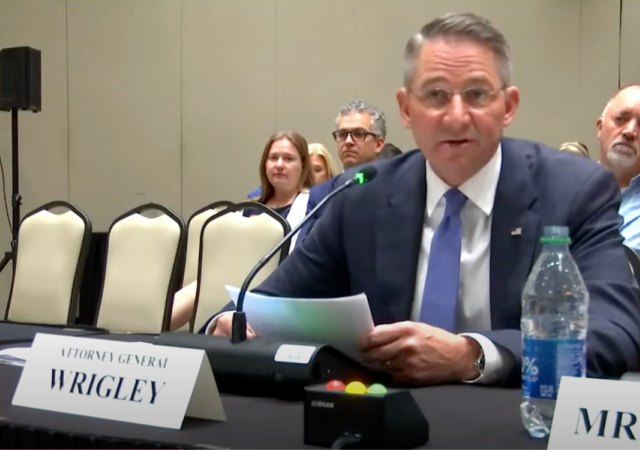North Dakota Officials Vent Frustration Over Northern Border Crisis to Congress

North Dakota officials vented their frustrations about the lack of border security to the House Judiciary Subcommittee on Immigration Integrity, Security, and Enforcement.
I’ve said many times we need to pay attention to all of our borders.
The border patrol lacks the resources at the northern border, just like the southern border.
“The situation has deteriorated significantly in recent years and the current situation is untenable with millions of illegal aliens streaming across America’s southwest border, said North Dakota Attorney General Drew Wrigley. “North Dakota is already experiencing negative law enforcement impacts as a result of the Biden Administration’s refusal to shut down the border.”
Wrigley fears “the worst is yet to come.”
North Dakota has become a hot spot for drugs because the criminals can mark up the price and make more money:
The large-scale production of fentanyl in Mexico is well documented both publicly and in law enforcement intelligence gathering. As a direct result of easily accessed illegal transport conduits into the United States from Mexico, fentanyl and other synthetic opioids are routinely available at the Southwest border area for 25 cents per pill, 15 cents per pill, or even 10 cents per pill, depending on the week or a few other factors. The pills are then easily transported to a variety of locations around the United States. North Dakota has become a significant draw for the traffickers because of the premium price they are able to garner for the pills here in our state. Prices of $60 per pill are not uncommon, and prices of $80 a pill are not unheard of, depending on supply in that region of our state at that particular time. Either way, the profit margin on the illegal pills is staggering! The cost is low at the southwest border because of the relative ease with which illegal entry is gained to the United States. A two-day drive north is all it takes to gain mark up of 23,900%. Basic economics are at work, and the most important factor in all of that is the open border providing the avenue by which low priced poison gets into the county easily and is readily available to enterprising drug traffickers willing to turn a two-day car ride into staggering profits, all at the cost of escalating carnage across North Dakota and the nation.
Wrigley’s full testimony.
The majority of people crossing the northern border come from Romania. Officials discovered many have ties to the Romanian mob.
The numbers are small compared to the southern border, but the jump is significant.
On February 6, border patrol apprehended 15 people in northeast North Dakota. The agents took in 19 people in the same area. All of them came from Romania.
Rebecca Davis, the executive director of the Walhalla Area Chamber of Commerce, described how reducing the operational hours at the port of entry has affected the community, reducing the number of Canadian visits.
The small community depends on tourism.
“Our town survives on Canadian businesses,” stressed Davis.
“Walhalla, with a population of approximately 800 residents, has lost our longtime supper restaurant, a favorite among Canadian visitors,” said Davis. “Jackson’s Bar has seen a decline in business due to people not being able to come and enjoy themselves in the evenings. Kristi Stremick, owner of the Parcel Barn, has had to hold onto packages for extended periods because Canadians cannot come to pick them up after work.”
Unfortunately, Walhalla has also witnessed the tragic part of illegal crossings in a brutal climate.
“Families and individuals crossing illegally have been found in perilous conditions in our fields,” recalled Davis. “Tragically, an Indian family was found deceased, and another family, a mother and two small children, were found with frostbite. They cross illegally in our region due to being told it’s easier to cross than the southern border, putting their lives at grave risk.”
Rebecca Davis’s full testimony.
The Grand Forks Sector (North Dakota) covers 861 miles with only 200 agents.
In 2021, officials only took in 90 people. It dropped to 81 people in 2022.
Apprehensions skyrocketed in 2023 to 300. They have already taken in 131 people in 2024.
Cass County Sheriff Jesse Jahner has tried to speak to Congress numerous times about the problems at the northern border.
“Although these area [southern border] have been largely impacted and have experienced significant changes in their community’s safety, narcotics trafficking, human trafficking, and violence, we in North Dakota and South Dakota are starting to see changes in our communities as it relates to these same issues,” Jahner said.
The states have also seen an increase in “narcotics trafficking and overdoses, a rise in mental health and addiction-related crimes, and homelessness.”
Those issues have strained “mental health and addiction services.”
Jahner also pointed out the lack of help from the feds.
Jahner recounted an incident where the department encountered 10-12 people trespassing on private property. Usually, the feds are helpful by checking immigration status and conducting a thorough background check.
The agents the deputies contacted admitted “that due to the current political environment, he was not optimistic they would be able to assist” the sheriff department.”
Jahner wanted to make sure the individuals posed no danger to his community, including drugs and human trafficking. The feds gave him the runaround for days. ICE eventually helped him out.
Jahner’s full testimony.
CLICK HERE FOR FULL VERSION OF THIS STORY